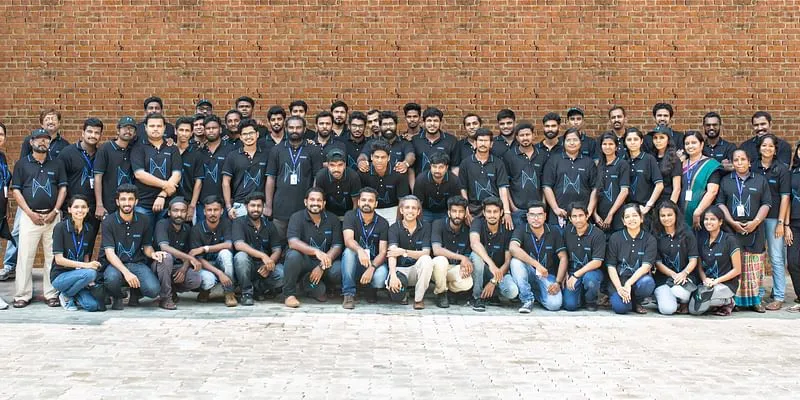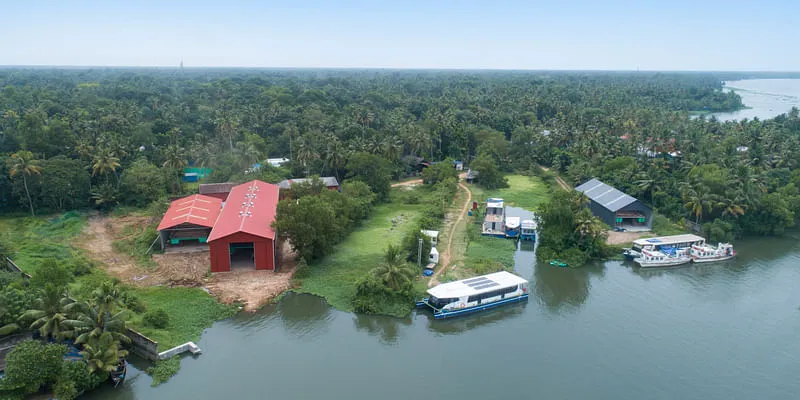Meet the man behind India’s first solar ferry boat who aims to conquer seas with green energy
Sandith Thandasherry started NavAlt in 2013 to design boats and ships that could save fuel and spare the marine ecosystem from carbon dioxide emissions. He built India’s first solar ferry boat and is now working on the world's first green energy RORO.
While ferries may seem like a cleaner mode of transportation, most ferries run on diesel which is a highly polluting fossil fuel. According to the European Union Monitoring Reporting and Verification of CO2 Emissions report, while ferries represent just 3 percent of all vessels, they account for 10 percent of all maritime pollution.
To help solve this problem, Kerala launched India’s first solar-powered ferry boat ‘Aditya’ in 2017. Promoting the use of clean energy, the boat prevents the burning of 35,000 litres of diesel each year and helps reduce carbon dioxide emissions. Sandith claims the boat has saved 100,00 litres of diesel to date.
Sandith Thandasherry, Founder and CEO of Kochi-based and Electric Boats, felt both content and proud when he created Aditya. But he didn’t stop innovating; he is also on his way to building available green energy powered RORO (cargo ships) and advanced techniques ships and boats for fishermen that are affordable and easy to use.
In an interaction with SMBStory, Sandith talks about the new developments and battling the limitations to contribute his bit to make the world a clean, and a better place.
The making of Aditya
A naval architect by profession, Sandith moved across places to design ships after completing his education at IIT Madras. Before founding NavAlt, he also spent years working in South Korean shipyards that are known for their big naval shipbuilders.
His journey with shipbuilding began early on in his 20s when he started Navgathi in the late 2000s to offer better ship design which, in turn, would help in saving fuel.
A chance encounter while working on ship designing led the team at Navgathi to crack an opportunity on building India’s first solar boat and thus began Sandith’s foray into manufacturing by starting NavAlt in 2013.
He started the manufacturing line by investing around Rs 3-4 crore out of his savings, as well as with contributions from friends and family. After four years of consistent hard work, he launched ‘Aditya’ in 2017, which was inaugurated by Kerala Chief Minister Pinarayi Vijayan and then Central Cabinet Minister for Power, Renewable Energy, Piyush Goyal as India’s first solar ferry boat. The boat was launched in association with Kerala State Water Transport Department

NavAlt team
The aim was simple – to bring electric ferry boats that could help replenish marine life from further damage, besides enabling commuters to make informed decisions.
“A diesel-run boat needs around 45-60 kW of power to ferry 60 passengers. With solar boats, we can bring down one-third of power consumption and Aditya consumes 15 kW of power. This has saved up a lot of fuel and also the carbon footprint which is hazardous for marine life,” Sandith explains.
Solar boats consume less power due to the usage of lighter material used like aluminium, composites, and lighter components. Sandith says that the Kerala government has been forthcoming about using solar ferries and this year, NavAlt would introduce 13 more solar ferries.
A self-reliant marine ecosystem
Sandith says that he has been working in association with France-based companies for tech development but except for lithium cells, which are imported, NavAlt products are all made in India.
“The state government has been very supportive,” he adds, and further claims that NavAlt is working on building solar electric RORO (Roll on-Roll off) that can carry large trucks and vehicles.
“This will be the world’s first solar electric RORO as of now. The project is significant since the central government has been pushing for building several ROROs across Gujarat, Varanasi, Goa, and Kerala,” Sandith tells SMBStory.
Sandith is also working on bringing solar fishing boats with the primary aim of improving the life of fishermen to save up on rising fuel costs by switching to solar electric fishing boats.
“A diesel boat costs around Rs 3 lakh to fishermen who usually source money from three to four families to purchase a boat. But the diesel costs them somewhere between Rs 3 to 3.5 lakh annually, given the rising fuel prices right now. The solar boat would cost them one time somewhere around 18-20 lakh, which is the price without any government subsidy that they could recover in a span of four to five years. However, if the sector is given subsidies and we get successful in scaling up, we aim to bring down the price of these boats to around Rs 10-12 lakhs,” Sandith explains.
He further adds that launching a solar boat solution for fishermen is ideal at this point, given the clean energy solution needed for India’s marine ecosystem.
Riding through the waves
Even though NavAlt has gained accolades for being ‘the first’ solar electric boat in India, Sandith says that there are a lot of challenges from the policy side.
“The central government is promoting the use of clean energy; however, the lack of focus on the marine ecosystem is hampering aquatic life. The promotion of EVs (electric vehicles) is good but there has to be some policy implementation and subsidies for solar projects in the sea route which can control the hazardous waste polluting the water bodies,” Sandith says.
“With diesel boats, the unburned fuel goes back to the water. Why are we doing this to our ecosystem? The government should allow electric boats in all the water bodies,” he further adds.

NavAlt shipyard at Kochi
Another challenge lies in working capital flow being disrupted.
“You see, it takes six to eight months to build a boat, and 80 percent payment is received only after the product is delivered. To survive, a company would either take a loan or raise outside funds. But debt is a debt and the entrepreneur falls in the vicious circle,” Sandith explains.
The destination
NavAlt is pushing to make India’s fastest solar electric catamaran boat which can travel at the speed of 12 knots, reducing travel time from 90 minutes to just 30 minutes. Sandith says that there’s a lot in the future as they are also planning to foray into the defence sector with its solar catamaran that demonstrates high-grade performance, agility, and technology.
The company has plans to introduce solar fishing boats in association with Shell Foundation, and Sandith reveals that NavAlt is looking for some strategic supporting hands and partnerships that can contribute to making the marine ecosystem clean and green.
Edited by Kanishk Singh







